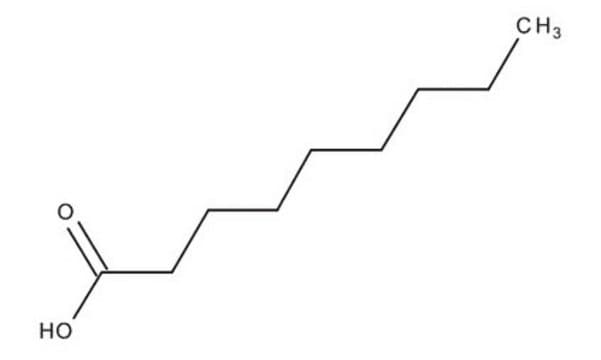N29902
Nonanoic acid
96%
Synonym(s):
Acid C9, Pelargonic acid
About This Item
Recommended Products
vapor density
5.5 (vs air)
Quality Level
vapor pressure
<0.1 mmHg ( 20 °C)
Assay
96%
form
liquid
expl. lim.
9 %
refractive index
n20/D 1.432 (lit.)
bp
268-269 °C (lit.)
mp
9 °C (lit.)
density
0.906 g/mL at 25 °C (lit.)
SMILES string
CCCCCCCCC(O)=O
InChI
1S/C9H18O2/c1-2-3-4-5-6-7-8-9(10)11/h2-8H2,1H3,(H,10,11)
InChI key
FBUKVWPVBMHYJY-UHFFFAOYSA-N
Looking for similar products? Visit Product Comparison Guide
Signal Word
Warning
Hazard Statements
Precautionary Statements
Hazard Classifications
Eye Irrit. 2 - Skin Irrit. 2
Storage Class Code
10 - Combustible liquids
WGK
WGK 1
Flash Point(F)
278.6 °F - Pensky-Martens closed cup
Flash Point(C)
137 °C - Pensky-Martens closed cup
Personal Protective Equipment
Certificates of Analysis (COA)
Search for Certificates of Analysis (COA) by entering the products Lot/Batch Number. Lot and Batch Numbers can be found on a product’s label following the words ‘Lot’ or ‘Batch’.
Already Own This Product?
Find documentation for the products that you have recently purchased in the Document Library.
Customers Also Viewed
Our team of scientists has experience in all areas of research including Life Science, Material Science, Chemical Synthesis, Chromatography, Analytical and many others.
Contact Technical Service






